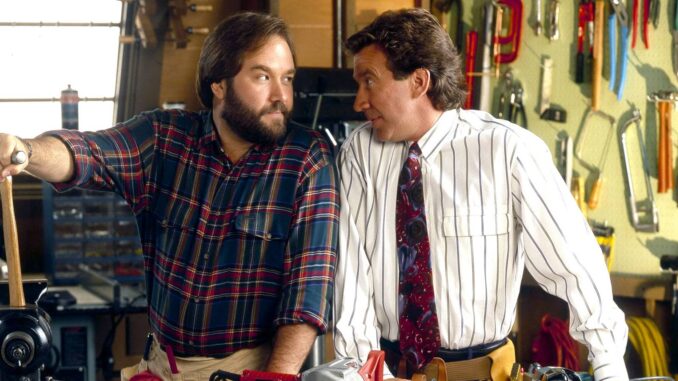
The Almost-Forgotten Workshop: How One Actor Nearly Lost His Spot on "Home Improvement"
The bright lights of Hollywood often obscure the darker corners of doubt and fear that lurk beneath the surface. For many actors, the constant pressure to perform, to be relevant, to avoid becoming a forgotten face in a sea of hopefuls, is a relentless companion. Richard Karn, beloved as Al Borland, the trusty foil to Tim Allen's blustering Tim Taylor on the hit sitcom "Home Improvement," knows this feeling intimately. He came shockingly close to being replaced by Allen himself, a revelation that throws a different light on the show's seemingly effortless chemistry and the enduring bond between its two leads.
The narrative of "Home Improvement" is one of suburban bliss punctuated by power tools and goofy antics. But behind the scenes, the story was less predictable. As Karn revealed in a recent interview, a contractual dispute threatened his place on the show early on. The details, while complex, boiled down to negotiations gone awry, leaving the network and production company scrambling for a solution. And their solution, it seemed, was a risky gamble: replacing Karn with Tim Allen portraying a character called Glen, Al’s twin brother.
Imagine the implications. The foundation of their comedic partnership, the comfortable cadence of their interactions, the familiar "I don't think so, Tim," all threatened to crumble. Karn, a relative newcomer compared to Allen's burgeoning stand-up career, was on the precipice of losing what could have been his defining role. He was caught in the crossfire of Hollywood's power plays, a stark reminder that even on a show as wholesome as "Home Improvement," the business side reigned supreme.
The prospect of Allen playing both roles is a fascinating, albeit unsettling, thought experiment. On the one hand, it speaks to Allen's undeniable talent and versatility. He could likely have pulled off the nuances of two distinct characters, showcasing a range beyond Tim Taylor's signature grunts and machismo. The comedic potential of twins with differing personalities, one prone to accidents and the other a stoic counterpoint, could have been explored.
However, the risk far outweighed the reward. The core dynamic of the show, built on the contrast between Tim's impulsive recklessness and Al's cautious pragmatism, was threatened. The audience, accustomed to Karn's down-to-earth portrayal, might have rejected the idea of Allen playing both parts, especially since the premise strained credibility. Furthermore, such a move could have been interpreted as a blatant act of overreach, damaging the show's credibility and potentially alienating viewers.
The near-replacement of Karn serves as a crucial reminder of the often-invisible contributions of supporting characters. Al Borland was more than just a straight man to Tim Taylor's antics. He was the voice of reason, the embodiment of safety consciousness, the grounded counterpoint to Tim's boundless enthusiasm. He was the reassuring presence that balanced the show's zany energy, grounding it in a relatable reality. To lose that balance, to sacrifice Karn's unique delivery for the sake of contractual expediency, would have fundamentally altered the show's DNA.
Thankfully, cooler heads prevailed. The contract dispute was eventually resolved, allowing Karn to reclaim his place as Al Borland. The show continued its run, achieving massive success and cementing its place in television history. But the brush with replacement remained a chilling reminder of the precarious nature of the entertainment industry.
Richard Karn's near-departure from "Home Improvement" offers a valuable lesson about the complexities of success, the vulnerability of actors, and the importance of recognizing the often-overlooked contributions of supporting characters. It's a reminder that even on a seemingly lighthearted sitcom, real-world anxieties and behind-the-scenes dramas can lurk just beneath the surface, threatening to dismantle the very foundations of what we see on screen. And perhaps, it also serves as a testament to the importance of good representation, and the power of negotiation in ensuring fair treatment in an industry known for its cutthroat nature. The memory of “Glen,” Tim Allen’s almost-born alter ego, remains a faint echo of what could have been, a testament to the delicate balance that keeps the wheels of Hollywood turning.